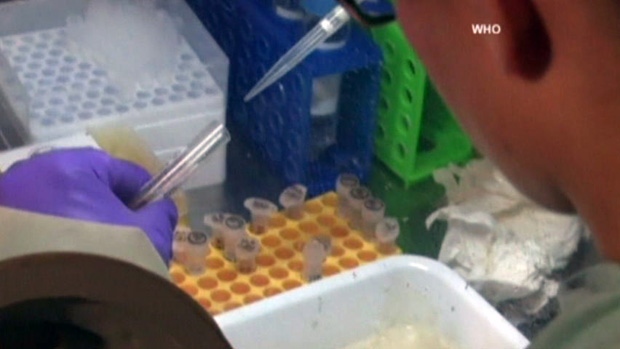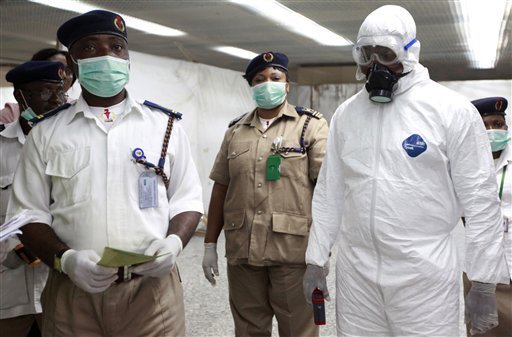An experimental Ebola treatment given to two American aid workers infected in Liberia is meant to neutralize damage from the virus, says a Canadian scientist who works with Ebola and other pathogens.
To make the unlicensed drug, scientists injected mice with parts of the Ebola virus and then harvested the antibodies the animals produced to fight the virus. The drug, which hasn’t yet been tested in humans, is grown in tobacco plants.
Researchers are also working on an experimental Ebola vaccine to prevent infection. But unlike a vaccine, the pre-clinical drug, called ZMapp, is designed to be given after exposure to the virus.
“It basically neutralizes the virus so it can’t do any further damage,” said Dr. Heinz Feldmann, chief of the U.S. National Institutes of Health’s virology laboratory in Hamilton, Montana.
Feldmann previously oversaw the special pathogens program at the Public Health Agency of Canada’s national microbiology lab in Winnipeg and is an expert in hemorrhagic fever viruses such as Ebola, as well as other viruses.
“It’s a cocktail of antibodies,” Feldmann said. “If you go through an infection as a human being or animal or get a vaccine, you will have an immune response to something foreign to your body. One response is using antibodies, a portion we call neutralizing antibodies.”
Neutralizing antibodies attack the virus by interfering with its surface.
Research on the Ebola drug was jointly conducted in Canada and the U.S. The Canadian research was led by Dr. Gary Kobinger, who now heads the special pathogens research program at the national microbiology laboratory.
Kent Brantly, a physician who works with the relief organization Samaritan’s Purse, was recently given ZMapp to treat his Ebola infection. Brantly, 33, contracted Ebola after treating Ebola patients at a missionary clinic in Liberia.
A second American aid worker, 58-year-old Nancy Writebol, was recently diagnosed with Ebola after working at a missionary clinic outside Liberia’s capital, where she contributed to relief efforts by the aid group SIM USA.
Bruce Johnson, president of SIM USA, said Tuesday that while Writebol is still very weak, she is showing signs of improvement. Amber Brantly, the wife of Dr. Kent Brantly, thanked medical staff at Emory University Hospital in Atlanta, where he is now being treated.
“I have been able to see Kent every day, and he continues to improve,” she said in a statement. Some people infected with Ebola recover on their own or thanks to early, supportive medical care.
Tom Frieden, director of the U.S. Centers for Disease Control and Prevention, said experts can’t be sure of the effect of an experimental drug such as ZMapp.
“Every medicine has risks and benefits,” Frieden said. “Until we do a study, we don’t know if it helps, if it hurts, or if it doesn’t make any difference.” Feldmann said there is always a risk the first time that an experimental drug is given to humans, which is why countries are provided with the pre-clinical safety data and have strict regulations before granting permission.
The U.S. Food and Drug Administration said it cannot comment on the development of specific medical products.
“Currently, there are only experimental Ebola treatments in the earliest stages of development. Even though a drug is not approved right now, the FDA can still provide access to potential products through other mechanisms, such as through an emergency investigational new drug (IND) application,” a spokeswoman said in an email.
The Public Health Agency of Canada said it was involved in the development of ZMapp, but the agency was not involved in the decisions to administer the treatment.
Experimental treatments
The World Health Organization says that as of Aug. 1, there have been at least 1,603 cases of Ebola in the current outbreak, which is centred in Guinea, Sierra Leone and Liberia. At least 887 of those people have died.
As the American aid workers receive the experimental cocktail, three leading Ebola specialists are calling for experimental drugs and vaccines to be offered to people in West Africa as well.
The plea came Tuesday from Peter Piot, who co-discovered Ebola in 1976, David Heymann and Jeremy Farrar. They are, respectively, directors of the London School of Hygiene and Tropical Medicine, the Chatham House Centre on Global Health Security, and the Wellcome Trust.
“African governments should be allowed to make informed decisions about whether or not to use these products — for example to protect and treat health-care workers who run especially high risks of infection,” they wrote.
They also called on the World Health Organization to take a greater leadership role to allow experimental treatments against Ebola.
Source: cbc




